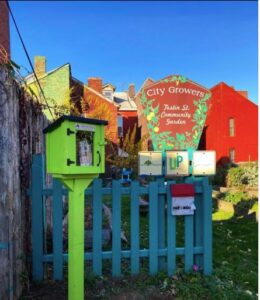______________________________
The Importance of Community Gardens in Urban Settings

Growing Together: Community Gardens and Their Impact on Urban Areas
In the heart of bustling urban landscapes, where concrete and steel dominate, there lies an unexpected oasis of green – community gardens. These spaces are more than just patches of soil; they are the lifeblood of the urban ecosystem, fostering connections, promoting sustainability, and providing fresh produce to areas often labeled as food deserts. For the Uptown community, the importance of these gardens cannot be overstated.
Bridging the Gap in Food Deserts
The term “food desert” refers to urban areas where access to affordable, nutritious food is limited. Community gardens play a crucial role in bridging this gap by providing residents with fresh, organically grown produce. By nurturing these green spaces, Uptown community members can enjoy fruits, vegetables, and herbs right in their neighborhood, reducing their reliance on distant grocery stores and fostering a sense of food security.
Fostering a Stronger Community
Community gardens are not just about growing plants; they are about growing relationships. These gardens bring together people from diverse backgrounds, creating a shared space where neighbors can meet, collaborate, and learn from one another. In Uptown, where community spirit is paramount, these gardens serve as hubs of social interaction, strengthening community bonds and fostering a sense of belonging.
Promoting Environmental Sustainability
In the Uptown EcoInnovation District Plan, sustainability is a core value. Community gardens embody this principle by promoting eco-friendly practices such as composting, rainwater harvesting, and organic farming. These gardens transform neglected urban spaces into vibrant green areas that enhance biodiversity, reduce urban heat islands, and improve air quality. By participating in community gardening, Uptown residents contribute to a healthier environment for all.
Educational Opportunities and Skill Development
Community gardens also serve as outdoor classrooms, offering educational opportunities for people of all ages. From learning about plant biology to understanding sustainable farming practices, these gardens provide hands-on experiences that can inspire a lifelong love for nature. For younger members of the Uptown community, these gardens are invaluable resources for developing practical skills and fostering environmental stewardship.
Enhancing Mental and Physical Well-being
Gardening is known to have numerous health benefits. It offers a form of physical exercise that can improve cardiovascular health, flexibility, and strength. Additionally, spending time in green spaces has been shown to reduce stress, anxiety, and depression. For the residents of Uptown, community gardens offer a tranquil retreat from the hustle and bustle of city life, promoting overall well-being.
Conclusion
Community gardens are vital assets in urban settings, especially within the Uptown community. They provide fresh food, foster social connections, promote sustainability, offer educational opportunities, and enhance mental and physical health. By supporting and participating in these gardens, Uptown residents can cultivate a stronger, healthier, and more connected community. So, let’s dig in and grow together!
If you have an interest in Uptown and would like to stay ‘plugged in’ to learn about community meetings, events, and opportunities, and more, email djohnson@uptownpartners.org and leave your name, email, and area of interest (ie. resident, business, etc.).




